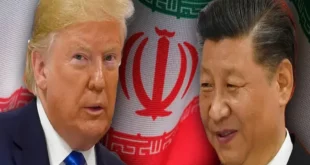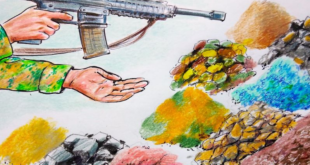As the U.S. looks to station over-the-horizon capabilities to address issues in Afghanistan, Central Asia is an obvious locale.
Both Russia and the Taliban, separately, have warned the states of Central Asia against hosting U.S. forces following Washington’s looming exit from Afghanistan. While it’s clear that U.S. and Central Asian officials have been in consistent contact regarding Afghanistan, no formal announcements have been made regarding basing U.S. troops in the region or other forms of cooperation.
On July 8, U.S. President Joe Biden said the U.S. military would complete its withdrawal from Afghanistan by August 31, ahead of the 20th anniversary of the 9/11 attacks on September 11.
In those remarks, Biden reiterated that the United States was “developing a counterterrorism over-the-horizon capability that will allow us to keep our eyes firmly fixed on any direct threats to the United States in the region, and act quickly and decisively if needed.”
A few days earlier in a July 6 press briefing, Pentagon Press Secretary John F. Kirby stressed that the U.S. was “capable of conducting over-the-horizon counterterrorism right now — it’s difficult but it’s doable.” Kirby said the U.S. was continuing to explore other options beyond existing capabilities tied to the carrier strike group currently in the Gulf of Aden and facilities in the Middle East, but did not elaborate.
In a previous press briefing, on July 2, Kirby stressed that “we already possess capabilities — over-the-horizon capabilities, particularly when it comes to — to counterterrorism — you’ve heard [Secretary of Defense Lloyd Austin] said there’s not a scrap of earth that we can’t hit if we really want to.”
In answering another question regarding “over-the-horizon” capabilities, Kirby pointed out that in making additional arrangements, Washington was dealing with foreign powers.
“But obviously if we’re talking about doing this in a foreign nation that foreign nation also has equities, also has to have decision space — and also should be allowed to speak for those equities and for those responsibilities. And so we’re going to respect that process as well.”
That particular statement came just as the Uzbek and Tajik foreign ministers were circulating Washington for meetings with both top State and Defense officials.
While Washington talks and waits, Moscow is warning Central Asian states against hosting U.S. forces.
According to an Associated Press report, in an interview published on July 13, Russian Deputy Foreign Minister Sergei Ryabkov said that President Vladimir Putin told Biden at their summit in Geneva last month that Russia did not want U.S. forces being redeployed to Central Asia.
“I would emphasize that the redeployment of the American permanent military presence to the countries neighboring Afghanistan is unacceptable,” Ryabkov said. “We told the Americans in a direct and straightforward way that it would change a lot of things not only in our perceptions of what’s going on in that important region, but also in our relations with the United States.”
Ryabkov added that Russia had made similar warnings to Central Asia. “We cautioned them against such steps, and we also have had a frank talk on the subject with our Central Asian allies, neighbors and friends and also other countries in the region that would be directly affected.”
In May, as several media outlets reported that the United States was exploring regional options, the Taliban issued a strongly-worded statement: “God forbid, if such a step is taken once again, it will be a great historic mistake and disgrace that shall forever be inscribed as a dark stain in history.” The statement went on to warn: “As we have repeatedly assured others that our soil will not be used against the security of others, we are similarly urging others not to use their soil and airspace against our country. If such a step is taken, then the responsibility for all the misfortunes and difficulties lies upon those who commit such mistakes.”
At the time, Zamir Kabulov, Russia’s presidential envoy for Afghanistan, said that Uzbekistan and Tajikistan had assured Moscow that basing U.S. troops in their countries was “impossible.” Russian officials have also reiterated several times that Kazakhstan, Kyrgyzstan, and Tajikistan are members of the Collective Security Treaty Organization (CSTO), and any presence of foreign troops on their territories must be endorsed by the security pact. This week, Russian Foreign Minister Sergey Lavrov said that none of the CSTO members had raised the issue with the organization. Notably, Uzbekistan is not a member of the CSTO.
Central Asian officials have not said much on the matter. Nevertheless, the decision whether and how to assist the United States in keeping tabs on nascent extremist threats emanating from Afghanistan is theirs to make.
 Eurasia Press & News
Eurasia Press & News




